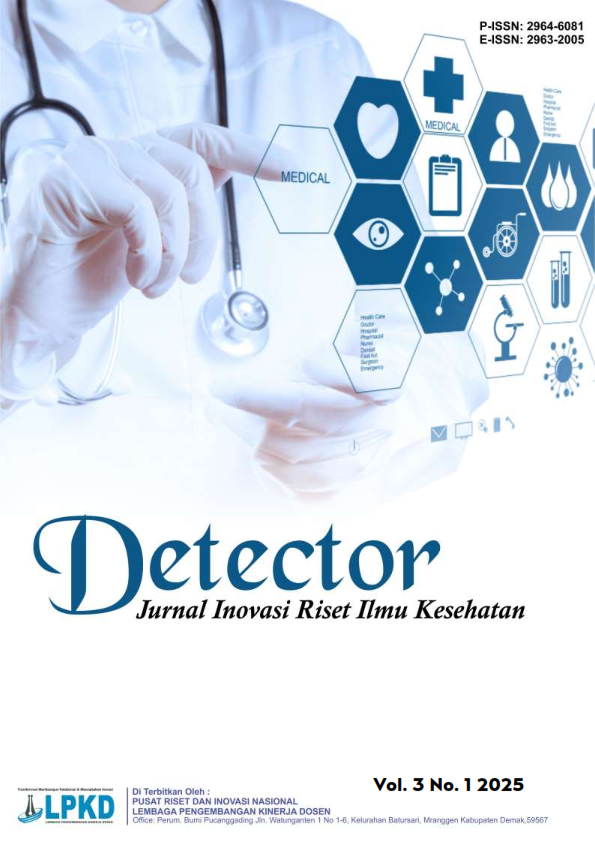Pengaruh Pengetahuan terhadap Kemampuan Cuci Tangan Keluarga Pasien dalam Mencegah Infeksi Nosokomial di RS Bhakti Asih Tangerang 2024
DOI:
https://doi.org/10.55606/detector.v3i1.4984Keywords:
Ability, Hand Washing, Knowledge, Nosocomial InfectionAbstract
Knowledge is the result of a person's knowledge of objects through their senses, namely the sense of hearing, sense of smell, sense of sight, sense of smell, and sense of touch. Ability is an individual's capacity to perform various tasks in a job. Hand washing is the activity of cleaning hands by rubbing and using soap and rinsing it in running water. The purpose of the study was to identify the relationship between the level of knowledge and the ability to wash hands in the families of patients regarding nosocomial infections in the inpatient room of Nusa Indah Bhakti Asih General Hospital, Tangerang. The research method uses the chi square test with the sampling technique used in this study is Non Random Sampling (Non Probability Sampling) which is carried out by Purposive Sampling technique. The instruments used in this study are the questionnaires used in this study, including knowledge of hand washing and handwashing ability sheet. Data analyzed This study uses the Chi square test for categorical data that is said to be related if p < 0.05. The results of the study showed that the P Value was 0.000, where the P Value was smaller than alpha (0.05), then H0 was rejected, meaning that knowledge was significantly related to the ability to wash hands in the patient's family regarding nosocomial infections in the Nusa Indah Inpatient Room, Bhakti Asih General Hospital, Tangerang City in 2024. In conclusion, there is a relationship between the level of knowledge and the ability to wash hands in the patient's family.
Downloads
References
Ather, H., Khan, & Shabnum, S. (2020). Knowledge and compliance toward standard precaution among health care workers at Bahria International. Journal of Social Science and Management.
Budiman, & Riyanto. (2014). Kapita selekta kuesioner: Pengetahuan dan sikap dalam penelitian. Jakarta: Salemba Medika.
Elvania. (2019). Hubungan edukasi cuci tangan terhadap pengetahuan, sikap, dan kemampuan keluarga di Rumah Sakit X Palembang.
Hardani, D., et al. (2020). Metodologi penelitian kesehatan. Jakarta: Salemba Medika.
Harefa, R. (2019). Hubungan tingkat pengetahuan dengan kemampuan cuci tangan pada keluarga pasien mengenai infeksi nosokomial di ruang rawat inap tahun 2023.
Idris, H. (2022). Hand hygiene: Panduan bagi petugas kesehatan. Jakarta: Kencana.
Inap, R., & Goeteng, R. R. (2021). Hubungan pengetahuan dengan kepatuhan penerapan perilaku pencegahan infeksi pada keluarga pasien di ruang rawat inap RSUD Dr. R. Goeteng Taroenadibrata. Jurnal of Bionursing.
Kementerian Kesehatan Republik Indonesia. (2017). Enam komponen rantai penularan.
Kementerian Kesehatan Republik Indonesia. (2022). Laporan Riset Kesehatan Dasar (Riskesdas) Provinsi Banten Tahun 2022.
Mubarak, W. I. (2017). Promosi kesehatan untuk kebidanan. Jakarta: Salemba Medika.
Notoatmodjo, S. (2018). Metodologi penelitian kesehatan. Jakarta: Rineka Cipta.
Nursalam. (2020). Metodologi penelitian ilmu keperawatan: Pendekatan praktis (Edisi ke-5). Jakarta: Salemba Medika.
Potter, P. A. (2015). Fundamentals of nursing. Mosby.
Puspitasari, P. L. W. (2019). Determinan kepatuhan dalam penerapan universal precaution. The Indonesian Journal of Occupational Safety and Health.
Roflin, & Liberty. (2021). Populasi dalam penelitian.
Safitri, W., Wihastutik, N., Nurhidayati, A., Kusumawati, H. N., Kusuma, U., Surakarta, H., & Surakarta, P. K. (2020). Edukasi dengan media audiovisual terhadap perilaku cuci tangan pada keluarga pasien rawat inap. Jurnal Kesehatan Kusuma Husada.
Sugiyono. (2019). Metode penelitian kuantitatif, kualitatif, dan R&D. Bandung: Alfabeta.
Downloads
Published
How to Cite
Issue
Section
License
Copyright (c) 2025 Detector: Jurnal Inovasi Riset Ilmu Kesehatan

This work is licensed under a Creative Commons Attribution-ShareAlike 4.0 International License.







